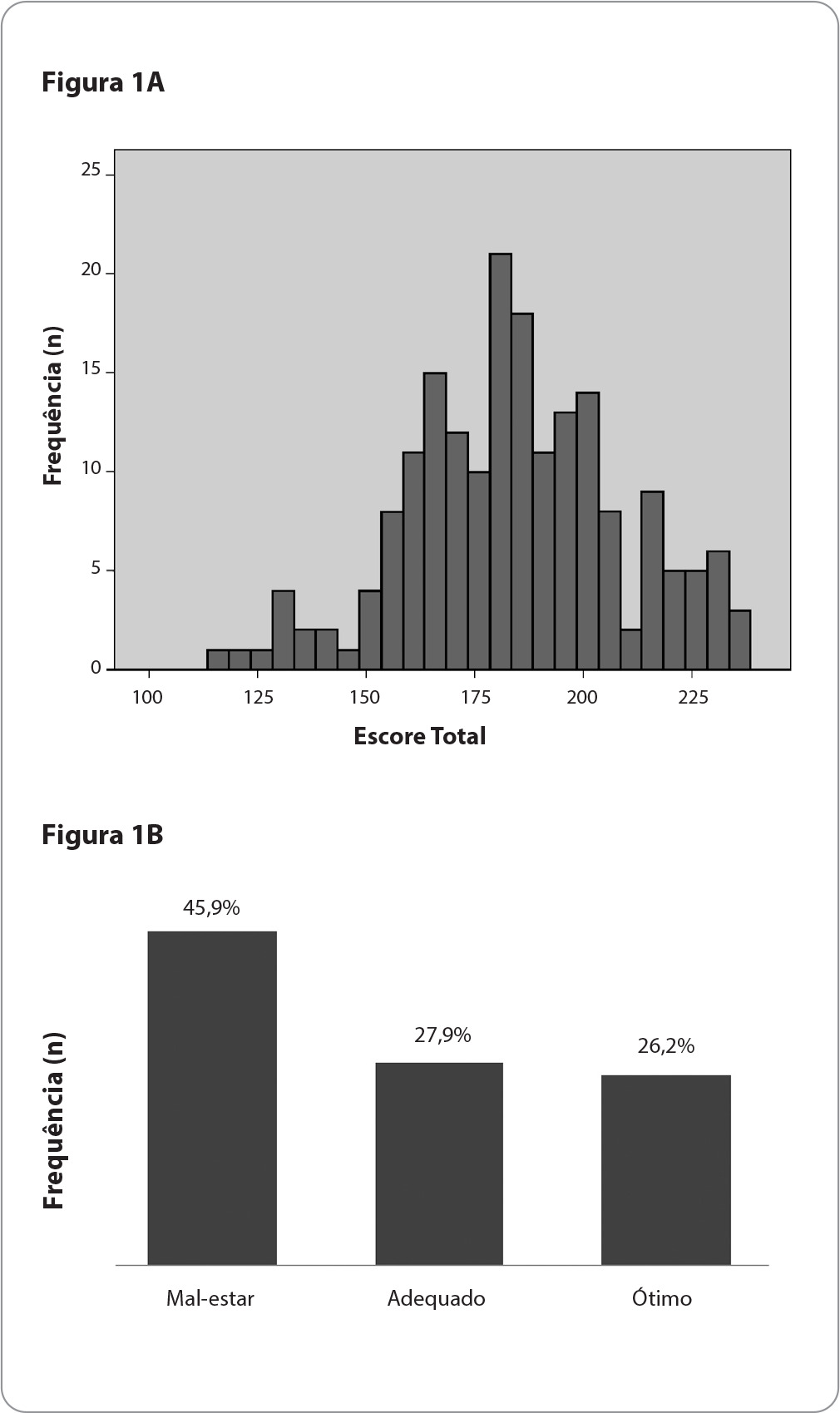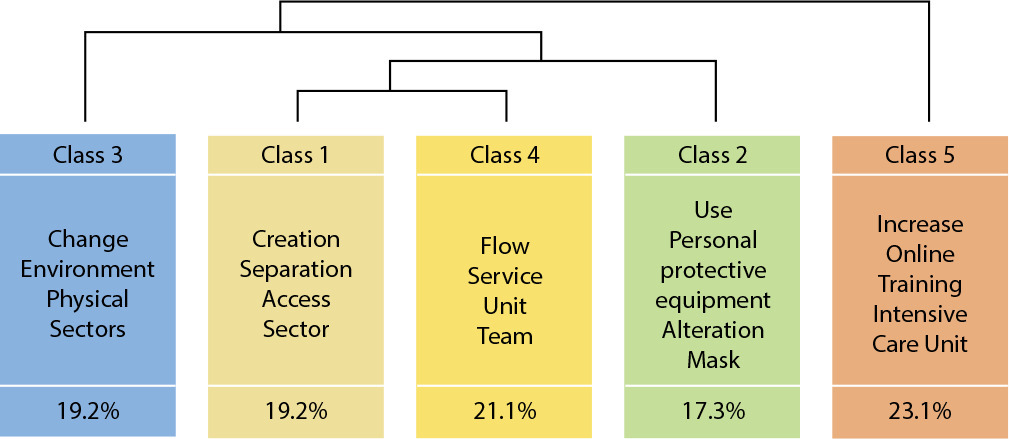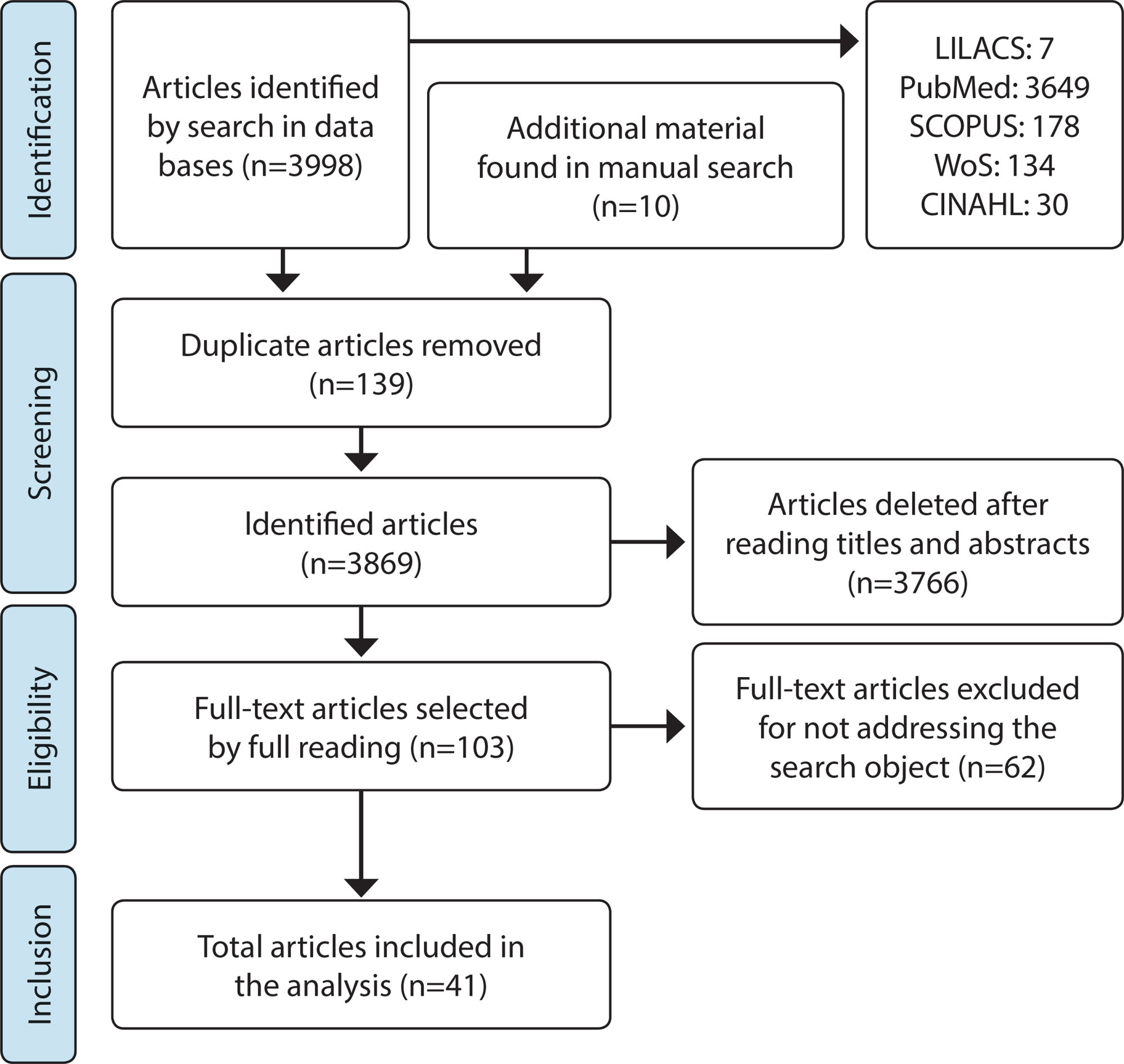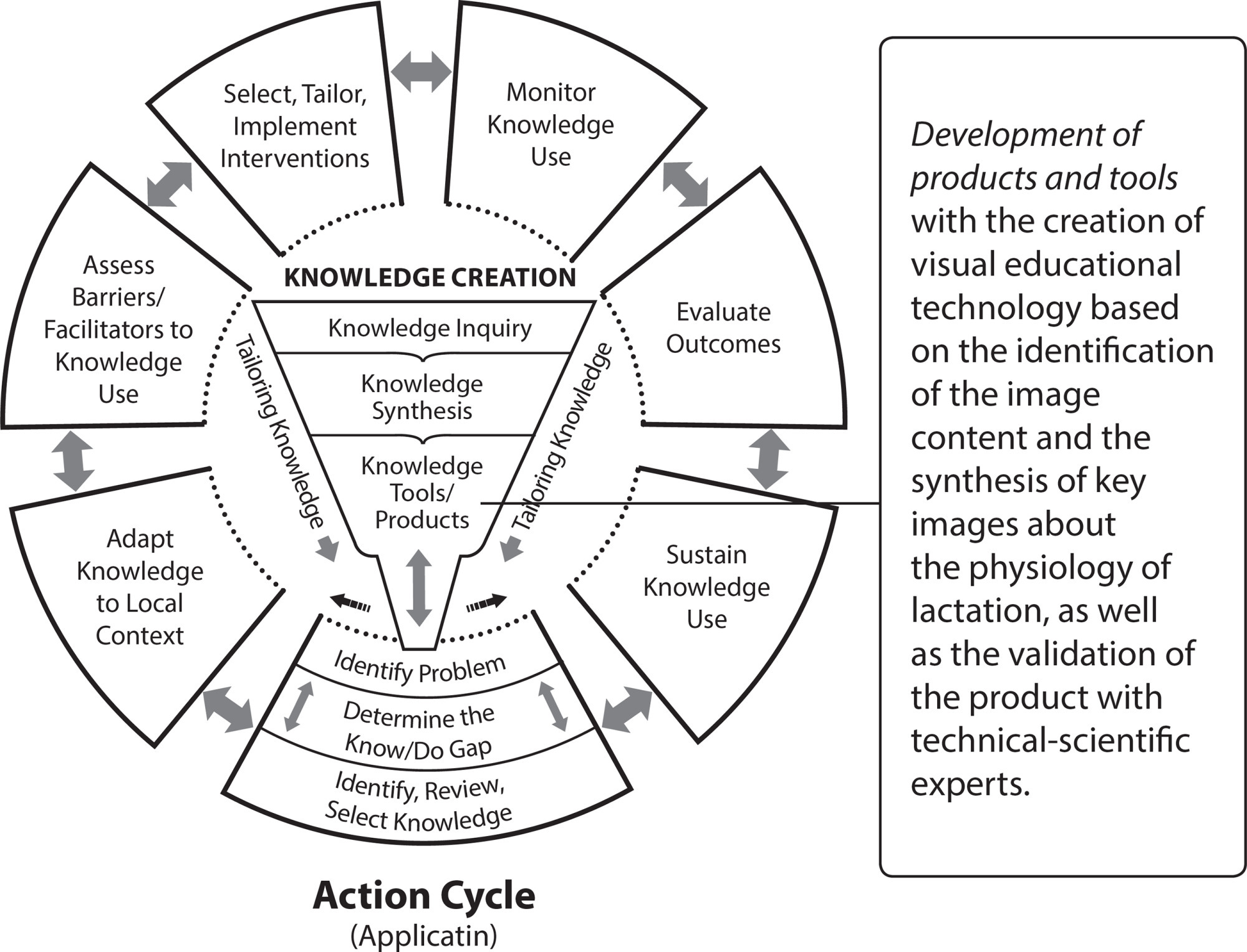-
REVIEW
Brazilian nursing specific situation, middle and micro-range theories: a bibliometric study
Revista Brasileira de Enfermagem. 2024;77(4):e20230520
09-20-2024
Abstract
REVIEWBrazilian nursing specific situation, middle and micro-range theories: a bibliometric study
Revista Brasileira de Enfermagem. 2024;77(4):e20230520
09-20-2024DOI 10.1590/0034-7167-2023-0520
Views0See moreABSTRACT
Objectives:
to map the nursing theories developed in stricto sensu graduate programs in nursing in Brazil.
Methods:
a bibliometric study, carried out on the Coordination for the Improvement of Higher Education Personnel Theses and Dissertations Portal in October 2023. The controlled descriptors “Nursing Theory” and “Nursing Models” and the uncontrolled descriptors “Theories” and “Middle-Range Theory” were used. Selected studies were cataloged for analysis, which was conducted by the study authors, who have a doctoral degree and expertise in research on nursing theories.
Results:
thirty-nine nursing theories were mapped, with a predominance of middle-range theories (79.5%), focusing on nursing diagnostic concepts and use of the theoretical-methodology strategy of theoretical-causal validity.
Conclusions:
the study identified nursing theories developed in Brazil, recognizing trends, development strategies, theorized objects of disciplinary interest and investments necessary for practical application in Brazilian contexts.

-
ORIGINAL ARTICLE
Sociocognitive factors determining compliance with standard precautions by nursing professionals during the COVID-19 pandemic
Revista Brasileira de Enfermagem. 2024;77(4):e20230301
09-20-2024
Abstract
ORIGINAL ARTICLESociocognitive factors determining compliance with standard precautions by nursing professionals during the COVID-19 pandemic
Revista Brasileira de Enfermagem. 2024;77(4):e20230301
09-20-2024DOI 10.1590/0034-7167-2023-0301
Views0See moreABSTRACT
Objectives:
to assess the socio-cognitive factors determining adherence to standard precautions by nursing professionals in care practice during the COVID-19 pandemic in Brazil.
Methods:
an analytical cross-sectional study, carried out with 9,039 nursing professionals in Brazil, using an electronic form containing participant sociodemographic, training and work variables, and the Brazilian version of the Standard Precautions Questionnaire. Descriptive and inferential statistics were used using the statistical software R.
Results:
participants recognize standard precautions as effective measures to reduce infections and report intention to perform them. Training regarding standard precautions was evidenced as a facilitator of adherence (4.72; SD: 0.73), and problems related to materials (3.78; SD: 1.45) were a hindrance.
Conclusions:
among the determining factors, facilitating organization presented the highest score, followed by intention to perform. Facilitating and hindering factor identification makes it possible to develop intervention strategies to strengthen patient safety and reduce occupational risks among professionals.
-
ORIGINAL ARTICLE
Middle-range theory for nursing for care in the context of cardiovascular risk
Revista Brasileira de Enfermagem. 2024;77(4):e20240190
09-20-2024
Abstract
ORIGINAL ARTICLEMiddle-range theory for nursing for care in the context of cardiovascular risk
Revista Brasileira de Enfermagem. 2024;77(4):e20240190
09-20-2024DOI 10.1590/0034-7167-2024-0190
Views0ABSTRACT
Objectives:
to develop a middle-range nursing theory for care in the context of cardiovascular risk.
Methods:
a theoretical development study, through induction through research and ICNP® practice standards, carried out in six stages: concept analysis; ICNP® terminological subset structuring; theory contextualization and purpose; proposition construction; modeling; and assumption construction.
Results:
the Theory of Care in the Context of Cardiovascular Risk has a middle-range scope, describing care, prescribing actions to promote health and reduce cardiovascular risk. Thirteen propositions were constructed in three categories (nursing metaparadigm, central and factorial concepts), two models and 16 assumptions.
Final Considerations:
the theory contributes to the construction of knowledge arising from the nursing process for care in the context of cardiovascular risk, generating propositions, assumptions and modeling, which will enable theoretical testing.
Keywords:Concept FormationHeart Disease Risk FactorsNursing TheoriesStandardized Nursing TerminologyTheoretical ModelsSee more
-
ORIGINAL ARTICLE
Content validity of guidance on self-care in the post-operative period for breast cancer
Revista Brasileira de Enfermagem. 2024;77(4):e20240188
09-20-2024
Abstract
ORIGINAL ARTICLEContent validity of guidance on self-care in the post-operative period for breast cancer
Revista Brasileira de Enfermagem. 2024;77(4):e20240188
09-20-2024DOI 10.1590/0034-7167-2024-0188
Views0See moreABSTRACT
Objectives:
to validate the content of a guidance guide on self-care in the postoperative period of breast surgery for breast cancer.
Methods:
a methodological study with content validity, carried out with 15 expert nurses and physiotherapists, between May and July 2022. Recruitment took place from the Lattes Platform, using snowball sampling. The level of relevance and representativeness for each item was verified using the Content Validity Index (CVI). It was considered valid when CVI was equal to or greater than 78% (0.78).
Results:
from the initial total of 37 items, two were excluded, as they had insufficient practical relevance and theoretical relevance, and another five items which, although presenting a CVI lower than the established cut-off, were suggested to be rewritten and grouped with other similar items.
Conclusions:
thirty items were considered valid and demonstrated important and significant characteristics, constituting suitable material for application in clinical practice.
-
ORIGINAL ARTICLE
Construction and enhancement of a prototype for a medical-hospital equipment for hypodermoclysis: a qualitative study
Revista Brasileira de Enfermagem. 2024;77(4):e20240059
09-20-2024
Abstract
ORIGINAL ARTICLEConstruction and enhancement of a prototype for a medical-hospital equipment for hypodermoclysis: a qualitative study
Revista Brasileira de Enfermagem. 2024;77(4):e20240059
09-20-2024DOI 10.1590/0034-7167-2024-0059
Views0See moreABSTRACT
Objectives:
to construct a Subcutaneous Hydration Device semi-functional prototype and gather initial information to improve this prototype design and realize its acceptance potential.
Methods:
a qualitative, descriptive and exploratory study, which used focus group, following the Technology Acceptance Model. The group was held at the Escola Superior de Enfermagem de Coimbra, Portugal, in December 2022, composed of nine participants from six different disciplinary areas, and followed thematic analysis.
Results:
four topics emerged associated with the device components: elastomeric infusion pump; needle/access device; clamp; administration set. From these topics, topics were triggered that highlighted: characteristics about the target population; ease of use and accessories; patient comfort and safety; and device application context.
Final Considerations:
the Subcutaneous Hydration Device semi-functional prototype is viable and interesting for the clinic. The results support its improvement and direct future investments for experimental studies.

-
ORIGINAL ARTICLE
Middle-range theory of the existential dimension of being-in-the-world of chronic kidney disease: Grounded Theory
Revista Brasileira de Enfermagem. 2024;77(4):e20230152
09-20-2024
Abstract
ORIGINAL ARTICLEMiddle-range theory of the existential dimension of being-in-the-world of chronic kidney disease: Grounded Theory
Revista Brasileira de Enfermagem. 2024;77(4):e20230152
09-20-2024DOI 10.1590/0034-7167-2023-0152
Views0See moreABSTRACT
Objectives:
to develop a middle-range theory of the existential dimension of being-in-the-world of chronic kidney disease in the light of humanistic nursing theory.
Methods:
exploratory-descriptive, qualitative, Grounded Theory study, whose guiding question was: what theoretical relationships can be established between clinical practice carried out in the context of renal replacement therapies and the concepts of humanistic nursing theory? Data were collected through semi-structured interviews with nursing staff and chronic kidney disease patients.
Results:
a theory was developed that describes and explains the existential dimension of being-in-the-world of chronic kidney disease, identifying the qualitative evidence present in this context.
Final Considerations:
the theory contributes to clinical nursing practice qualification in nephrology, consolidating nursing as an art and science, because it arises from care practice and research, in addition to rescuing what differentiates it within the health disciplines, which is care par excellence.

-
ORIGINAL ARTICLE
Transgender people’s knowledge about the adverse effects of cross-hormonization: challenges for nursing
Revista Brasileira de Enfermagem. 2024;77(4):e20230346
09-20-2024
Abstract
ORIGINAL ARTICLETransgender people’s knowledge about the adverse effects of cross-hormonization: challenges for nursing
Revista Brasileira de Enfermagem. 2024;77(4):e20230346
09-20-2024DOI 10.1590/0034-7167-2023-0346
Views0See moreABSTRACT
Objectives:
to identify trans women’s and men’s knowledge about the adverse effects of cross-hormonization and understand the repercussions of hormonization practices on trans women’s and men’s health.
Methods:
exploratory, descriptive, qualitative research, developed with 41 participants, from July 2019 to February 2020, in a trans health outpatient clinic. Thematic-categorical content analysis was used.
Results:
from the analysis, the categories emerged: Knowledge about the adverse effects of cross-hormonization; and Cross-hormonization practices and their meaning.
Final Considerations:
nursing practices, based on the identification of knowledge about adverse effects and the understanding of cross-hormonization practices in trans women’s and men’s health, can result in more inclusive care.
-
EDITORIAL
Potential of Artificial Intelligence in Evidence-Based Practice in Nursing
Revista Brasileira de Enfermagem. 2024;77(5):e770501
09-09-2024
Abstract
EDITORIALPotential of Artificial Intelligence in Evidence-Based Practice in Nursing
Revista Brasileira de Enfermagem. 2024;77(5):e770501
09-09-2024DOI 10.1590/0034-7167.2024770501
Views0Evidence-based practice (EBP) has established itself as a fundamental pillar in nursing, driving effective clinical decision-making based on high-quality scientific research. The primary goal of EBP is to ensure that patients receive the most appropriate and safe care, based on the best available evidence. In this context, knowledge synthesis methods are essential tools for EBP, […]See more
-
ORIGINAL ARTICLE
Fatores associados ao bem-estar materno em situação de parto de puérperas em Minas Gerais
Revista Brasileira de Enfermagem. 2024;77(6):e20230304
12-16-2024
Abstract
ORIGINAL ARTICLEFatores associados ao bem-estar materno em situação de parto de puérperas em Minas Gerais
Revista Brasileira de Enfermagem. 2024;77(6):e20230304
12-16-2024DOI 10.1590/0034-7167-2023-0304pt
Views1RESUMO
Objetivos:
analisar os fatores associados ao bem-estar materno em situação de parto de puérperas em Minas Gerais.
Métodos:
estudo transversal, aninhado a uma coorte, realizado com puérperas em um município mineiro. Foi adotada a escala Bem-Estar Materno em Situação de Parto 2. Estimaram-se as prevalências do bem-estar materno em situação de parto. A magnitude da associação entre mal-estar materno e práticas assistenciais foi estimada pela Razão de Prevalência (RP), utilizando-se a regressão de Poisson.
Resultados:
participaram 183 puérperas com idade entre 15 e 46 anos, sendo que 26,2%, 27,9% e 45,9% relataram, respectivamente, ótimo, adequado e mal-estar na assistência ao parto. O mal-estar materno foi mais prevalente entre puérperas que passaram por parto cesárea (RP = 1,60) e que não receberam informações sobre amamentação (RP = 1,59).
Conclusões:
observou-se elevada prevalência de mal-estar no parto, associada à realização de cesáreas e à falta de informações sobre amamentação.
Keywords:Assistência ao PartoBem-Estar MaternoHumanização da AssistênciaParto ObstétricoPeríodo Pós-PartoSee more
-
ORIGINAL ARTICLE
The nursing practice environment and hospital sociotechnical complexity: a mixed-methods study
Revista Brasileira de Enfermagem. 2024;77(6):e20230315
12-16-2024
Abstract
ORIGINAL ARTICLEThe nursing practice environment and hospital sociotechnical complexity: a mixed-methods study
Revista Brasileira de Enfermagem. 2024;77(6):e20230315
12-16-2024DOI 10.1590/0034-7167-2023-0315
Views1See moreABSTRACT
Objectives:
to analyze the relationship between the nursing practice environment and hospital sociotechnical complexity as perceived by nurses.
Methods:
a sequential explanatory mixed-methods study was conducted in a hospital in southern Brazil. The Brazilian version of the Practice Environment Scale-Nursing Work Index and the Complexity Characterization Questionnaire were administered to 132 nurses. Subsequently, semi-structured interviews were conducted with 18 participants, and the data were subjected to thematic analysis. Data integration was achieved through a connection approach.
Results:
the nursing practice environment was found to be favorable, except in the subscale concerning Staffing and Resource Adequacy, where complexity was present in the activities. The three emerging categories explained human and technical aspects related to complexity in the practice environment, quality of care, and patient safety. Unexpected variability was inversely correlated with the practice environment.
Conclusions:
the study results indicate a relationship between these constructs, with implications for the quality and the safety of care.

-
REVIEW
Recommendations for guidelines for promoting mental health in the workplace: an umbrella review
Revista Brasileira de Enfermagem. 2024;77(6):e20240086
12-16-2024
Abstract
REVIEWRecommendations for guidelines for promoting mental health in the workplace: an umbrella review
Revista Brasileira de Enfermagem. 2024;77(6):e20240086
12-16-2024DOI 10.1590/0034-7167-2024-0086
Views1See moreABSTRACT
Objectives:
to summarize the recommendations of guidelines for promoting mental health in the workplace.
Methods:
an umbrella review, according to Joanna Briggs Institute and Preferred Reporting Items for Systematic reviews and Meta-Analyses methodological assumptions. Data collection was carried out in January 2021 and updated in July 2023 in the American Psychological Association, Cochrane Library, EMBASE, National Library of Medicine, and Scopus databases. Systematic reviews that assessed guidelines with recommendations for mental health care for workers were included. PROSPERO registration CRD42023461845.
Results:
four systematic reviews published between 2015 and 2018 were identified. The abstracts highlighted actions that facilitate and inhibit the recommendations as well as three categories of intervention: primary prevention – worker protection; secondary prevention – promoting workers’ mental health; and tertiary prevention – supporting, monitoring and rehabilitating workers upon returning to work.
Conclusions:
the interventions are based on prevention, promotion and early recognition, support and rehabilitation of mental health problems.

-
ORIGINAL ARTICLE
Changes implemented in the work environment of nurses in the COVID-19 pandemic
Revista Brasileira de Enfermagem. 2022;75:e20201381
11-29-2022
Abstract
ORIGINAL ARTICLEChanges implemented in the work environment of nurses in the COVID-19 pandemic
Revista Brasileira de Enfermagem. 2022;75:e20201381
11-29-2022DOI 10.1590/0034-7167-2020-1381
Views0See moreABSTRACT
Objective:
to describe the changes implemented in the work environment of nurses in university hospitals considering the COVID-19 pandemic.
Methods:
this qualitative and descriptive research was developed from an online survey with 75 nurses from three Brazilian university hospitals. Data processing occurred through textual analysis with the aid of software IRAMUTEQ.
Results:
five semantic classes were obtained: Organization of units for exclusive care of patients with COVID-19; Adaptations in the use of personal protective equipment; Physical structure adaptation; Care flow institution; Increased number of beds and training courses. Final considerations: the results show the effort of healthcare and nursing professionals/managers in the development of structural adaptations and reorganizations of care processes, in the hospital context, to respond with quality and efficiency to the demands arising from the COVID-19 pandemic.

-
ORIGINAL ARTICLE
Permanent education for good practices in the prevention of pressure injury: almost-experiment
Revista Brasileira de Enfermagem. 2019;72(6):1646-1652
10-21-2019
Abstract
ORIGINAL ARTICLEPermanent education for good practices in the prevention of pressure injury: almost-experiment
Revista Brasileira de Enfermagem. 2019;72(6):1646-1652
10-21-2019DOI 10.1590/0034-7167-2018-0778
Views0See moreABSTRACT
Objective:
To verify the effectiveness of the educational intervention through the evaluation of nurses’ knowledge about prevention of pressure injury.
Method:
A quasi-experimental study with a single group, carried out with 95 nurses from a teaching hospital in the interior of Minas Gerais, in August and September 2017. As a teaching strategy, the active methodology and hybrid teaching were used, based on the reference of the Method of the Arch of Charles Maguerez. Data were collected from a validated instrument, called the Pieper Knowledge Test, and analyzed by descriptive statistics and Student’s t-test with significance level of p <0.001.
Results:
The mean number of correct answers obtained by the nurses was 78.8% in the pre-test and 88.8% in the post-test, and the difference was statistically significant (p <0.001).
Conclusion:
The educational intervention developed was effective, since it contributed to the improvement of nurses’ knowledge.

-
ORIGINAL ARTICLE
Nurse care for the hospitalized elderly’s spiritual dimension
Revista Brasileira de Enfermagem. 2019;72:236-242
12-05-2019
Abstract
ORIGINAL ARTICLENurse care for the hospitalized elderly’s spiritual dimension
Revista Brasileira de Enfermagem. 2019;72:236-242
12-05-2019DOI 10.1590/0034-7167-2018-0685
Views0See moreABSTRACT
Objective:
to analyze the nurse care for the spiritual hospitalized elderly’s dimension.
Method:
a qualitative study, based on Jean Watson’s Theory of Human Caring. The study included 17 nurses working in a geriatric center in Salvador City, Bahia State, Brazil. The collection of testimonies occurred between January and April of 2018, through an interview.
Results:
spiritual care were dialogue, encouragement and respect for religious activities, embracement, empathy. One of the obstacles to providing this care was the lack of preparation in accessing the elderly’s spiritual dimension.
Final considerations:
spirituality is a dimension of human and holistic nursing care. Caring for the spirit contributes to foster transpersonal care. The difficulty may be in the lack of nurses’ preparation. It is necessary that they cultivate and live their own spirituality, transmitting the understanding in each care relationship.
-
EXPERIENCE REPORT
Use of webQDA software on qualitative nursing research: an experience report
Revista Brasileira de Enfermagem. 2020;73(3):e20180411
04-03-2020
Abstract
EXPERIENCE REPORTUse of webQDA software on qualitative nursing research: an experience report
Revista Brasileira de Enfermagem. 2020;73(3):e20180411
04-03-2020DOI 10.1590/0034-7167-2018-0411
Views0See moreABSTRACT
Objectives:
to report the user experience of the webQDA software in the support of qualitative data analysis about health literacy of older adults.
Methods:
quasi-experimental research developed from January 2014 to January 2015, with 118 older adults, all of whom were interviewed to assess the level of health literacy. Interviews were carried out before and after four educational interventions, according to Freire’s method named Culture Circle. The interviews were transcribed and entered in the software, which highlighted the analytical categories.
Results:
the systems of sources, interpretative encoding and questioning of the data available in the software allowed the construction of three categories for the literacy levels and four categories for their dimensions.
Final considerations:
We concluded that the webQDA software enables the structured encoding of qualitative materials, ensuring faster and effective management of data with systematization and analytical transparency.

-
Concept analysis of Perioperative Thirst for the development of a new nursing diagnosis
Revista Brasileira de Enfermagem. 2021;74(1):e20200065
03-03-2021
Abstract
Concept analysis of Perioperative Thirst for the development of a new nursing diagnosis
Revista Brasileira de Enfermagem. 2021;74(1):e20200065
03-03-2021DOI 10.1590/0034-7167-2020-0065
Views0See moreABSTRACT
Objectives:
to analyze the perioperative thirst concept for the development of a new diagnostic structure according to NANDA International.
Methods:
a concept analysis study based on the framework proposed by Walker and Avant, instrumentalized through an integrative literature review based on SCOPUS, CINAHL, PUBMED, LILACS, and WOS. The elaboration of the diagnostic structure followed NANDA International guidelines.
Results:
41 studies were analyzed revealing that perioperative thirst is prevalent and intense, having visceral and behavioral attributes as the core of the concept. Antecedents indicate that surgical patients are vulnerable to thirst; and consequents 16 signs and symptoms were organized and model cases were developed. A diagnostic structure has been developed for perioperative thirst.
Final Considerations:
concept analysis allowed language standardization that describes thirsty patients, helping the identification, planning of actions and communication of perioperative nursing care.

-
REFLECTION
Nursing Process in the Brazilian context: reflection on its concept and legislation
Revista Brasileira de Enfermagem. 2022;75(6):e20210898
05-11-2022
Abstract
REFLECTIONNursing Process in the Brazilian context: reflection on its concept and legislation
Revista Brasileira de Enfermagem. 2022;75(6):e20210898
05-11-2022DOI 10.1590/0034-7167-2021-0898
Views0ABSTRACT
Objectives:
to reflect on the global understanding of the Nursing Process concept, with emphasis on the Brazilian context.
Methods:
a reflection article, aligned with the vision and expertise of researchers who are members of the Nursing Process Research Network.
Results:
the reflection is presented in two main topics: The evolution of Systematization of Nursing Care X Nursing Process concepts and its consonance with national and international practices, and Brazilian legislation; The Nursing Process concept realignment in Brazilian legislation in line with current care, teaching and research practices. Final Considerations: the reflections were oriented to the Nursing Process’ conceptual, normative and legal issues, including elements of its historical evolution, and, with that, pointed to the need to modify the Brazilian regulation on the Nursing Process.
Keywords:Education, NursingLegislationNursingNursing CareNursing ProcessStandardized Nursing TerminologySee more -
ORIGINAL ARTICLE
Creation and validation of a visual educational technology content for lactation physiology learning
Revista Brasileira de Enfermagem. 2020;73(6):e20190564
09-07-2020
Abstract
ORIGINAL ARTICLECreation and validation of a visual educational technology content for lactation physiology learning
Revista Brasileira de Enfermagem. 2020;73(6):e20190564
09-07-2020DOI 10.1590/0034-7167-2019-0564
Views0ABSTRACT
Objective:
to create and validate a visual educational technology content for lactation physiology learning.
Method:
a methodological study that contemplated the stages of content creation and validation guided by the conceptual model of Knowledge Translation into action. The creation took place in partnership with the educational technology center of the project’s home institution. The validation was attended by 27 judges with experience in the obstetric, neonatal, pediatric or maternal and child areas and in the theme of breastfeeding.
Results:
an educational technology covered animation and video techniques to locate, respectively, elements of lactation physiology and the population involved. An Overall Content Validity Index of 0.84 was obtained.
Conclusion:
the visual educational technology for lactation physiology learning has been validated in content as a tool to introduce the theme and mediate health education actions that can have a positive impact on breastfeeding.
Keywords:Audiovisual ResourcesEducational TechnologyHealth EducationLactationTranslational Medical ResearchSee more
-
ORIGINAL ARTICLE
Risk of suicide among nursing students
Revista Brasileira de Enfermagem. 2021;74(6):e20200867
08-20-2021
Abstract
ORIGINAL ARTICLERisk of suicide among nursing students
Revista Brasileira de Enfermagem. 2021;74(6):e20200867
08-20-2021DOI 10.1590/0034-7167-2020-0867
Views0See moreABSTRACT
Objectives:
to identify the risk and degree of risk of suicide in nursing students of a public institution in the countryside of Pernambuco, Brazil.
Methods:
this was a cross-sectional, quantitative research conducted with 150 students. For data collection, a sociodemographic questionnaire and the instrument, M.I.N.I. – Brazilian version 5.0.0 – Module C – Risk of suicide were used. Statistical analyses were performed with IBM(® )SPSS(®), version 23.
Results:
53.3% of nursing students had a risk of suicide, of which 20.7% had a high risk. Moreover, 22.67% reported previous suicide attempt. It is noteworthy that students without a partner have a higher risk of suicide (56.8%) than those with a partner (29.4%).
Conclusions:
it is perceived the need to develop programs that identify students at risk of suicide in higher education institutions, in order to raise awareness of the problem and implement policies to promote mental health in the academia.
Search
Search in:
Nuvem de Tags
Aged (144) Atenção Primária à Saúde (239) COVID-19 (104) Cuidados de Enfermagem (269) Educação em Enfermagem (151) Educação em Saúde (139) Enfermagem (930) Estudos de Validação (131) Health Education (144) Idoso (208) Mental Health (149) Nursing (987) Nursing Care (306) Patient Safety (151) Primary Health Care (284) Qualidade de Vida (104) Quality of Life (106) Saúde Mental (145) Segurança do Paciente (150) Validation Studies (108)



